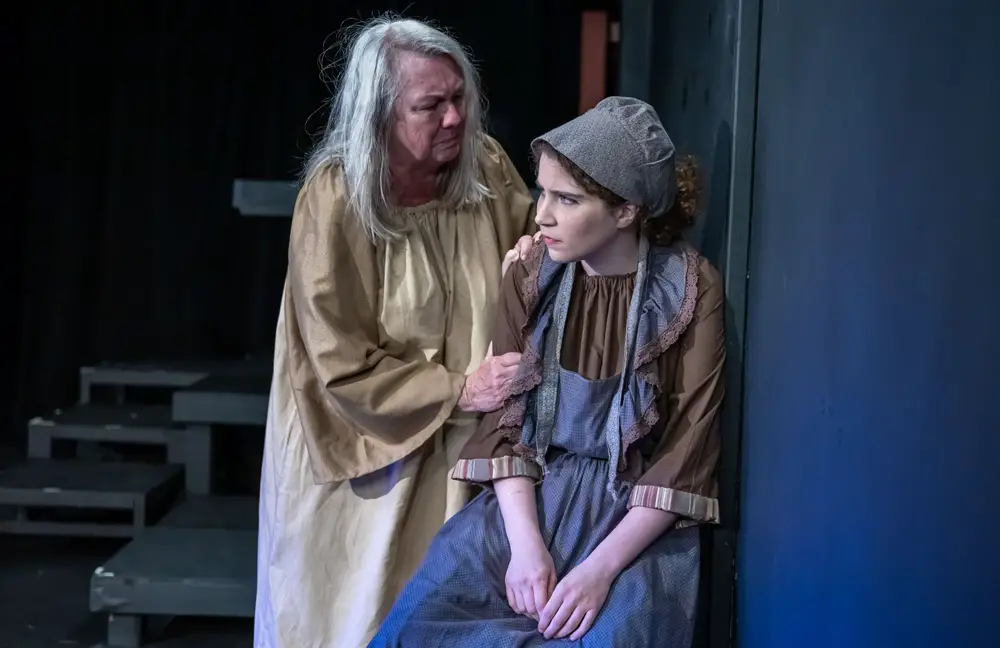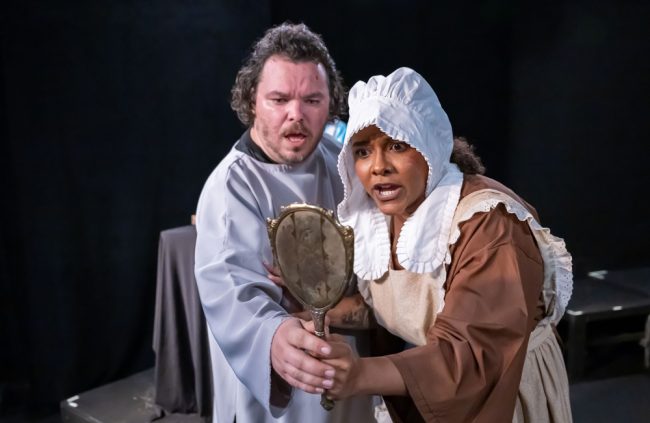
When self-described “Witch Finder General” Matthew Hopkins published his pamphlet “The Discovery of Witches” in England in 1647, he described a menagerie of eldritch, infernal beasties he had encountered – “imps” or “familiars,” he called them, creatures that the devil himself had conjured to serve as witches’ helpers.
One such familiar was Vinegar Tom, “who was like a long-legg’d Greyhound, with an head like an Oxe, with a long taile and broad eyes, who when this discoverer spoke to, and bade him goe to the place provided for him and his Angels, immediately transformed himselfe into the shape of a child of foure yeeres old without a head, and gave halfe a dozen turnes about the house, and vanished at the doore.”
That greyhound-ox beast – or was it a cat? – is the co-star, metaphorically, of the 1976 play “Vinegar Tom” by British playwright Caryl Churchill, which City Repertory Theatre will stage at various times Friday March 15 through Sunday March 24 at its black box venue in Palm Coast.
“I wanted to write a play about witches, with no witches in it . . . about poverty, humiliation and prejudice and how women were accused of witchcraft and how they saw themselves,” said Churchill, who’s known for her fearless explorations of sexual politics, gender and power relationships, and feminist issues. The now-85-year-old dramatist garnered more accolades than any other writer in a 2011 poll by the Village Voice for its story “Who Is the Greatest Living Playwright?”
“ ‘Vinegar Tom’ uses the hunt for witches in the 17th century as a tool to investigate the subjugation of women in a male-dominated society,” says City Rep director John Sbordone. “The lessons of the past are reflected in many aspects of our own society.”
Churchill, says Sbordone, “explores the free-spirited Alice, the destitute Joan (Alice’s mother), the subservient Susan, the caged-in Betty, and the ever-helpful Ellen in the context of their repressive environment.”
Trouble brews when Alice and Joan are accused of witchcraft by their neighbors, the married couple Jack and Margery.
“You can see Jack and Margery are products of their age,” Sbordone says. “They cannot accept the fact that their crops are failing and their cattle are dying. They don’t want to think ‘What have I done to displease God?’ Then they find a scapegoat in Joan: ‘Well, it’s witchcraft. She’s got a cat!’ ”
Despite Matthew Hopkins’s 380-year-old “eyewitness” testimony, Churchill’s casting of Vinegar Tom as a cat is perhaps her sly reference to the hysteria that engulfed the Witch Finder General: Where other 17th-century English villagers saw a mere cat, he perceived a sinister, malformed instrument of the devil.
Churchill, however, introduced more overt witchery, technique-wise, into her play: In homage to innovative German playwright Bertolt Brecht, “Vinegar Tom” is peppered with seven songs performed not by the characters but from the detached perspective of a modern-day chorus commenting upon the actions and behaviors of these 17th-century villagers.

The method in Churchill’s madness, as stated by the theatre department of Indiana University (Sbordone’s alma mater, by the way) in its thorough, engaging exploration of “Vinegar Tom,” is to “remove the audience from complete narrative emersion.”
And why, pray tell, would a playwright not want her audience immersed in the narrative of her play?
“That’s the whole idea behind Brecht,” Sbordone says. “He was so fed up with audiences getting immersed and emotionally involved and giving over to the romantic side of things – romantic in the larger sense of the word – that he created what is called the ‘alienation effect.’
“You get involved in Alice and her trouble and then – whomp – there’s a song that takes you right out of it. So you go back and look at what Alice said. You have to explore it or see it from a different, more objective point of view, that’s all. It’s that simple.
“ ‘Vinegar Tom’ is not a story with a beginning, a middle and an end. It’s organized in a very Brechtian fashion. Scenes are in and of themselves but have an emotional tie to the overall theme, the overall meaning of the show, while not necessarily having a continuous plot line.”
Brecht created 30 such plays, Sbordone says.
“Of course, this is Caryl Churchill and she created it as a homage to Brecht,” he adds. “But unless she said that and you were familiar with Brecht, you wouldn’t know.”
Each of the female characters “is demonstrative of how women are subjugated by the patriarchy,” Sbordone says. “Alice seeks freedom and of course she gets accused of witchcraft. Betty is trying to run away because her parents are forcing her to marry an older man whom she doesn’t love. Susan, Alice’s friend, is constantly pregnant by her husband after having miscarriage after miscarriage. Ellen is the cunning woman, an apothecary, a medicine woman, and the issue of abortion comes up in terms of termination of pregnancy through drugs, although it’s never overt.”
Both Sbordone and Anna Hobbs, who portrays Alice, agree that Alice is the most modern character in the show.
“Alice is obviously different than most people in the town,” Hobbs says. “She’s an unwed mother and she’s promiscuous, so that definitely puts a target on her back. Alice is someone who wants to be loved for who she is, someone who wants to be free of the constraints of society. I don’t think she’s trying to be a revolutionary – she’s just reacting to the world around her and wanting to reshape it like a lot of young women do, and she’s being blocked at every turn and that’s really frustrating.
“Alice’s sexual freedom I think comes from a more vulnerable place than just wanting to have sex because it’s fun – it’s the only way she can get connection.”
Along with the play’s “alienation effect,” there’s another twist to “Vinegar Tom”: The play calls for each theater that stages it to create original music using lyrics from the script. In City Rep’s case that duty has fallen to the troupe’s frequent and longtime music director, keyboardist Ben Beck. It was Beck who urged Sbordone to have City Rep present the play.
“Ben has been after me for six years to do it,” Sbordone says. As befitting a play about witches (real or imagined), Beck’s seven songs are, Sbordone adds, “marvelously strange. He’s composed different types of music. He emulates Philip Glass on some of his approaches. I asked him to compose one song in the style of Kurt Weill as a tribute to Brecht and Weill.”
(That duo famously collaborated on “The Threepenny Opera,” the 1928 “play with music” that included the song “Mack the Knife.”)
“These songs are enormously interesting, and because they’re so different they provide a perspective that we don’t often have,” Sbordone says. “This play ain’t ‘Annie.’ It ain’t ‘The Sound of Music.’ ”
With a nod to City Repertory Theatre’s history of staging provocative plays, such as Samuel Becket’s “Waiting for Godot,” Nassim Soleimanpour’s “White Rabbit Red Rabbit.” Lauren Gunderson’s “The Revolutionists,” David Ives’ “Venus in Fur” and others, Sbordone says that “ ‘Vinegar Tom’ may be the most radical show that we’ve done in a while.”
![]()
City Repertory Theatre will stage “Vinegar Tom” at 7:30 p.m. March 15-16 and March 22-23, and 3 p.m. March 17 and March 24. Performances will be in CRT’s black box theater at City Marketplace, 160 Cypress Point Parkway, Suite B207, Palm Coast. Tickets are $30 adults and $15 students, available online at crtpalmcoast.com or by calling 386-585-9415. Tickets also will be available at the venue just before curtain time.
The cast includes:
Alice – Anna Hobbs
Susan – Jen Chidekel
Betty – Liz Post
Joan – Robin Davis
Margery – Phillipa Rose
Jack – Beau Wade
Ellen – Joanne Van Zyl
Goody – Bethany Stillion
Packer – Andrew Trotter
Bellringer/Sprenger – Benjamin Beck
Kramer – Eleanor Coyne
Singer – Laniece Fagundes






























Endless Dark Money says
Seems a little woke for production in racist rons neck of woods. Will likely be banned shortly… Bad for little girls to know they’ve been subjugated, they dont need to control their bodies. Got rid of black history already why not women’s history too. Teach women how they learned skills taking care of house….. End womens suffrage right republicons?